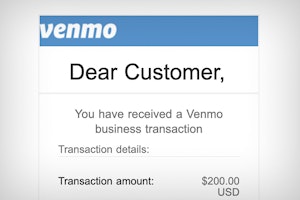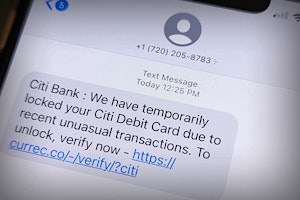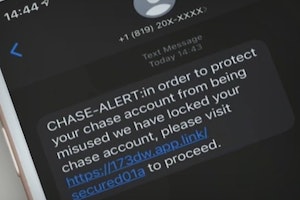
Most Read

How to Get Verified on Instagram (And Increase Your Chances)

Real or Fake Apple Watch? 8 Ways to Tell the Difference

Real vs. Fake AirPods Pro—9 Ways to Tell the Difference

Fake AirPods: How to Spot Real Apple AirPods from Counterfeits

How to Check if an App is Safe to Download
Instagram In Depth
- Types of Instagram Scams
- How to Beat Instagram Scams
- Protection for Instagram Users
- Report Instagram Scams
Initially released in 2010, Instagram started as a photo-sharing app, allowing users to upload and edit photos and tag friends and places within the snaps. An instant hit, the app proved so popular that it was purchased by its biggest rival, Facebook, in 2012, and the company has held controlling shares ever since.
Like many forms of social media, Instagram eventually evolved, growing to let users incorporate videos and create “stories,” which involve a series of photos or videos that disappear after 24 hours. And the app has also grown significantly in terms of usage, with roughly 1 billion active users as of 2021.
As such, Instagram has become a must-have platform for modern businesses, big and small. The app has adapted accordingly, including more marketing-friendly features that allow certain accounts to advertise more easily and share links to outside pages within their content.
Unfortunately, these features also make it easier for scammers to share their schemes on the app. Masquerading as a company—or even a regular user or “influencer”—scammers can easily get in touch with any number of people through advertising or direct messages, leading you to content cleverly disguised as legitimate posts but intended to suck you into their scam.
It's important to verify links and contact details to beat imposters.
Types of Instagram Scams
There are several different ways scammers have used Instagram to find would-be victims. Some may pose as companies looking to sell things; others may pose as people looking to help, and a few may even go as far as pretending to fall in love with you.
But whether they’re purportedly pithing products or popularity, these accounts all have one thing in common: They’re trying to take advantage of you.
Free Instagram Followers and Likes Scam
Let’s face it; social media is all about popularity. And on apps like Instagram, users can even get paid for sponsored posts if they have enough followers. So, gaining followers and collecting likes is a huge goal for many Instagram users.
Scammers know this and have hatched many schemes aimed at those looking to grow their Instagram following. These scammers will often send you a direct message, advertising more likes or followers—for a price. But the pitch is almost always a hoax. They’ll take your money and run, without delivering any of the goods. (And even if they do, the followers will be bots or fake profiles, not actual people.)
Fake Investment Scams
Most forms of social media have given rise to investment scams, and Instagram is no exception. In this version, scammers reach out to you via direct message or sponsored ads, claiming that for a minimal investment, you’ll be able to make a large amount of money.
The scam involves exchanging financial information and finances with the so-called “investor.” It may even pay off in small amounts at first—but once you trust the scammer enough to send them a large amount of money, they’ll disappear and take your cash with them.
Instagram Romance Scams
One of the cruelest scams targeting the app is the Instagram romance scam. This involves users reaching out to you—again, typically through direct message—and striking up a relationship.
Their “proof” of existing will be their Instagram profile and all of their posts, which will indeed look legitimate. The romance may even advance to other apps, like Whatsapp, to encourage more communication and strengthen the connection between you. But, eventually, the scammer will ask for funds for one reason or another—then ghost you if you get suspicious.
Fake Brands Scam
One of the most prominent scams on Instagram is fake brands and fake brand accounts. One count has the number of bogus accounts at nearly 50,000 and the number of counterfeit products offered in all fashion posts at 20%.
These accounts will aggressively advertise their goods—often at steeply discounted prices—but what they sell you will be counterfeit at best, non-existent at worst, and they’ll collect your personal and financial information when you order them to boot.
Instagram Phishing Scams
Phishing scams are another inevitability in the online world. On Instagram, they can take many forms but frequently look like direct messages with embedded links, urging you to click for one reason or another.
The sender can look like a trusted brand or friend, or even Instagram itself, alleging that there’s some problem with your account. But the link you click on could download dangerous malware onto your advice—and any information you enter into the website could be used to steal your identity.
How to Beat Instagram Scams
Beating Instagram scams is not an exact science. However, scammers are constantly adapting their schemes to stay one step ahead of even an informed user.
That’s why a healthy amount of skepticism—especially when viewing ads or direct messages—is the best tool to fight off Instagram scams.
Still, there are a few red flags to look out for that tend to point to a scam in the works:
- Messages from a friend or company you know asking you to click on a link.
- If you know the person sending it, make sure to ask them—through a different platform—if they sent you the link and why.
- Any direct message from any person or company you don’t know.
- A message asking you to move the conversation off Instagram to a less public and secure setting, such as through personal email.
- A message telling you that you’ve won a prize or asking for a fee to claim it.
- Messages from anyone claiming to work for Instagram or Instagram security.
- The app will NEVER contact you via direct message.
- Messages from an unverified account claiming to represent a well-known person or company.
- Verified accounts will have a blue checkmark next to their name.
- Messages or accounts that are riddled with grammatical errors or use strange turns of phrases.
- Accounts that have very few posts or followers.
If you encounter any of these situations, it’s best not to interact with them. A scammer needs your information or, at the minimum, your participation to scam you.
It’s also a good idea to NEVER:
- Click on any unverified link.
- Clicking on ANY link is dangerous; that goes double if you don’t know the person sending it to you.
- Give away sensitive information on Instagram, including:
- Your full name, birthday, and address.
- Your credit card or bank account information.
- Your password or PIN code.
- Any information that can be used to guess your password on Instagram or other apps.
- Any information that can be used to answer your verification questions on Instagram or other apps and websites.
Protection for Instagram Users
Instagram primarily promotes a strong defense as your best offense against scams and scammers. Additional ways to protect yourself, your account, and your personal information include:
- Picking a strong password. This includes something with upper- and lower-case letters, numbers, symbols, and something different from your other accounts.
- Changing your password regularly.
- Logging out of Instagram when you’re done using it. If you’re using another person’s phone or public computer, make sure the “Remember Me” box is NOT checked when you sign in.
- Using two-factor authentication. This provides an extra layer of security (a code that’s texted to you) to log in.
- Making your account private. This means only people you follow can see your posts and message you.
- Checking your login activity. You can do this by going to “Settings” and clicking on “Login Activity.” You’ll then be shown a list of all the times and locations you’ve logged into your account. If you don’t recognize some, you’ll know there’s a problem.
Report Instagram Scams
Instagram is aware of the scams targeting its users and encourages the reporting of any signs of misuse, either through:
- Your feed. You can do this by tapping the three dots above the post, then clicking “Report.”
- Direct messages. Do this by tapping the person’s name at the top of your chat, clicking “Report,” then following on-screen instructions.
- The person’s profile. Click on the three dots in the top right-hand corner of the page, click “Report,” and follow the directions to complete the process.
If you think you were the victim of a scam—especially a phishing scam that involved taking your personal information—you may also want to:
- Contact your local authorities.
- Report the incident to:
- Your bank and credit card companies.
- The Federal Trade Commission.
- Freeze any credit or debit cards involved.
- Change all of your passwords.
- Keep a close eye on your financial accounts and activity.
Again, the best way to protect yourself against scammers is by remaining wary—even of interactions that may seem innocent. In the online world, a little bit of vigilance can go a long way.
Scams Impacting Instagram

How to Protect Yourself from 6 Common Apple Pay Scams
Apple Pay may be a convenient way to send money, but it's also become a favorite among scammers looking to make a quick buck at your expense.

Apple Support Scam: Beware of Callers Impersonating Apple
If you receive a phone call from Apple Support, it could be a scammer attempting to steal your information and access your accounts.

Beware of Fake Apple Phishing Emails: Don't Click Any Links
If you've been notified that your Apple ID has been locked, don't click the link in the email as this could be an attempt to steal your password.

Tinder Code Scam Leads to Monthly Porn Subscriptions
The Tinder safe dating scam tricks users into giving up their credit card info to verify their profiles and leads to auto-enrollment in monthly subscription-based porn sites.

Apple Gift Card Scam: Red Flags of Imposters After Your Money
Whether it's the IRS, Social Security office, or a relative, be careful with anyone asking for payment via an Apple gift card—it's likely a scam.

How Do You Beat Gift Card Scams? Never Pay Using Gift Cards
Beating this scam is simple—don't pay for anything using gift cards and don't give anyone you don't know or trust your gift card information.

Selling on Facebook Marketplace? Beware of Fake Venmo Emails
Scammers are sending fake Venmo emails to Facebook Marketplace sellers in an attempt to steal login information and money.

Citibank Text Message Scam: Locked Debit Card Alert Is Fake
If you've received a locked debit card text message from Citibank, it's likely a scam. Don't click on the link and delete the text message.

Real Chase Fraud Text Alert or Scam Message?
If you receive a text message from Chase Bank, don't click on any links or call the phone number listed—it could be a scam designed to steal your information and money.

Amex Fraud Text Alert Scams: Spotting a Fraud
If you receive a text message from American Express, don't click on any links or call the phone number listed—it could be a scam designed to steal your information and money.
Guides To Protect Against Computers & Technology Scams

How to Get Verified on Instagram (And Increase Your Chances)
Are you looking to get that verified tick on your Instagram profile? Here's what you need to do and everything you'll need.

New Apple Pay Text Scam Claims Account Has Been Suspended
Multiple text message scams are circulating around the world which claim that your Apple Pay has been suspended. We provide multiple examples of this scam and how to avoid this Apple Pay scam.

Best Password Managers for 2023: Editor's Picks
Keeping your accounts secure means having a unique password for each one which is difficult unless you use a password manager.

McAfee Scam Email Claiming That Your Device is At Risk
Phishing emails from scammers posing as McAfee are attempting to steal your private information such as credit card details, account logins, social security number, date of birth and more.

Identity Theft: The Best Identity Theft Protection Services
Over 1.4 million Americans reported being victims of identity theft in 2021. With the rapid rise of identity theft, it is now more likely that you will become a victim of identity theft than to have your car stolen.
News About Computers & Technology Scams

Apple Fights Back Against Counterfeiters on Social Media
Apple creates a team for the sole purpose of removing fake products from social media sites.

Urgent CDC Warning: Eye Drops Linked to 3 Deaths, Loss of Vision
The CDC is warning eye drops users of a rare bacterial infection from 2 brands of eye drops. The infection is resistant to antibiotics and has resulted in the loss of vision, loss of eyeballs and the death of 3 patients.

Banks May Refund More Zelle Scam Victims in 2023
Zelle scams have reached a serious volume. New reports suggest that banks are looking at new refund protections for customers in 2023.

Optus Data Breach - One of the Worst Cyberattacks in Australia
Hackers have gained access to 9.8 million customer records from Optus in Australia, exposing personal information such as driver licence, medicare and passport details.

Roe vs. Wade Overturned: Abortion Rights in Your State
Find out what the overturning of Roe vs. Wade means for abortion rights in your state.